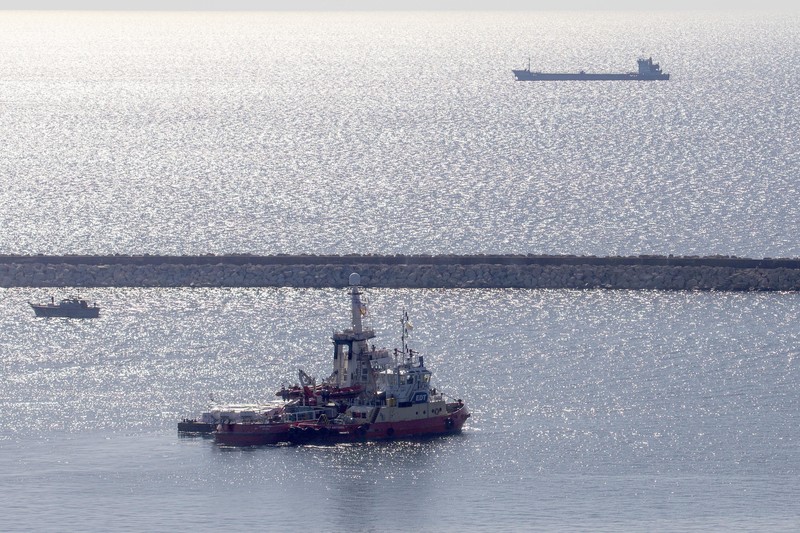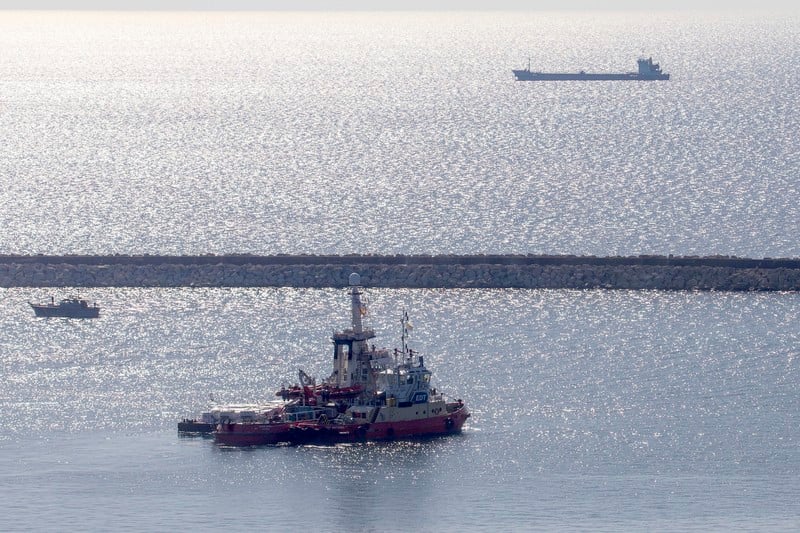
A boat carrying humanitarian aid for Gaza departs from the port of Larnaca, Cyprus on 12 March.
Xinhua News Agency
The first aid ship set sail from Cyprus to the Gaza Strip on Tuesday after US President Joe Biden announced plans for a maritime corridor to the coastal enclave.
The ship is carrying about 200 tons of food, water and medicines.
The United Arab Emirates is funding the mission, which is organized by the US-based World Central Kitchen charity. The ship is supplied by a Spanish organization by the name of Proactive Open Arms.
The ship and its accompanying barge should arrive at a coast in northern Gaza within two days at most, and will dock at a jetty built by the Spanish charity.
Biden had announced plans to build a “temporary pier” off the Mediterranean coast of Gaza to establish a maritime corridor of aid between Gaza and the rest of the world.
“Tonight, I’m directing the US military to an emergency mission to establish a temporary pier in the Mediterranean on the coast of Gaza that can receive large shipments carrying food, water, medicine and temporary shelters,” Biden said during the State of the Union address last week.
“A temporary pier will enable a massive increase in the amount of humanitarian assistance getting into Gaza every day,” Biden added.
The “temporary” port, which officials said would take 30 to 60 days to build, would be attached to a temporary causeway at the coast of Gaza.
The US dispatched the first logistics vessel on 9 March carrying equipment to build the pier.
Countries that have consistently supported Israel’s genocide of Palestinians in Gaza or failed to call for a ceasefire are on board for the “maritime corridor” plan.
The European Union, Germany, Greece, Italy, the Netherlands, Cyprus, the United Arab Emirates, the UK and the US are all behind the project in various capacities.
Famine engineers endorse plan
The “Amalthea Initiative” will see Israel taking part in the inspection of goods in Cyprus before ships are routed towards the Gaza coast.
And the Israeli military will be managing the “security” for the port, Biden said.
“Who is going to provide security for the port you’re planning to build to offer aid in Gaza?” a reporter asked Biden as news of the port plans broke.
“The Israelis,” the US president responded.
The Jerusalem Post said the maritime corridor plan was Prime Minister Benjamin Netanyahu’s idea, citing an unnamed “senior diplomatic source.”
Netanyahu had reportedly first proposed the plan to Biden in October, and pressed the issue again with the US president in January.
“This source, close to the prime minister, insinuated that Biden was simply implementing a plan by Netanyahu, not actually initiating anything new,” the Post reported.
While touring Gaza’s coast in a naval vessel on Sunday, Israeli defense minister Yoav Gallant expressed enthusiasm about the plans of a maritime corridor.
“The process is designed to bring aid directly to the residents and thus continue the collapse of Hamas’s rule in Gaza,” he said.
Gallant was reportedly briefed alongside the Israeli navy commander and the head of COGAT, Israel’s bureaucratic arm of the military occupation, on Sunday about the logistics of building the port.
It was the same Gallant who announced on the third day of Israel’s genocide in Gaza that Israel would be “imposing a complete siege on [Gaza]. No electricity, no food, no water, no fuel – everything is closed.”
“We are fighting human animals, and we act accordingly,” he said at that time, speaking of Gaza’s population of 2.3 million Palestinians, half of whom are children, and most of whom are refugees from areas beyond the Gaza boundary.
A few days ago, Gallant said: “We will bring the aid through a maritime route that is coordinated with the US on the security and humanitarian side, with the assistance of the UAE on the civil side, and appropriate inspection in Cyprus, and we will bring goods imported by international organizations with American assistance.”
Political motivations
But why would Israel, the engineer of the Gaza famine, endorse the idea of establishing a maritime corridor for aid to address a crisis it initiated and is now worsening?
This might appear paradoxical if one were to assume that the primary aim of the maritime corridor is to deliver aid.
Palestinians in Gaza received the news about the planned port with fear and suspicion.
Analysts have speculated that this could be a ploy to eliminate Egypt as an outlet between the Gaza Strip and the rest of the world, and sever the coastal enclave’s reliance on Egypt economically and politically by way of the Egyptian-controlled Rafah crossing – the sole point of exit and entry for most people in Gaza.
This would ostensibly complete Israel’s control of the Gaza Strip without dependence on Egyptian cooperation, reliable as it may have been.
Abdel Bari Atwan, a Gaza-born world-renowned Palestinian journalist, invoked the US-facilitated evacuation of thousands of Palestinian guerilla fighters of the Palestine Liberation Organization from Beirut in 1982 as an insight into what these plans could possibly suggest.
Palestinian fighters were transferred by US warships off the Beirut coast to Cyprus and eventually to Tunisia.
Atwan indicated that the maritime corridor would create a pathway for the forcible evacuation of Palestinians by sea.
Other analysts have expressed similar fears.
US Secretary of State Antony Blinken implicitly denied speculation that this move would permanently close the border at Rafah and the Kerem Shalom commercial crossing, during a press briefing on Wednesday.
“And I want to emphasize: It is a complement to – not a substitute for – other ways of getting humanitarian assistance into Gaza,” Blinken said.
“And, in particular, overland routes remain the most critical way to get assistance in and then to people who need it.”
Those assurances will do little to assuage concerns. If and when the American and Israeli-controlled port is in place, there is no telling what Tel Aviv and Washington may then do.
“Glaring distraction”
Michael Fakhri, the UN special rapporteur on the right to food, slammed what he called “absurd” US plans for getting aid into Gaza, whether through airdrops or the temporary port.
“From a humanitarian perspective, from an international perspective, from a human rights perspective, it is absurd in a dark, cynical way,” he said.
Human rights groups have dismissed announcements of building a temporary pier as a distraction from Israel’s systemic and deliberate policy of starvation of Palestinians in Gaza.
“The proposed maritime humanitarian corridor and temporary seaport is another tool to weaponize aid,” the Palestinian refugee advocacy group Badil said.
It is meant to “absolve Israel of its responsibilities and obligations, and support Israel in its ‘day after plans’: to eliminate and replace UNRWA [the UN agency for Palestine refugees] and establish a potential mechanism for Palestinian forcible transfer out of the Gaza Strip.”
UNRWA’s operations in Gaza are on the verge of collapse as donor countries, including the US, the agency’s largest funder, suspended $440 million worth of aid during February after Israel made unverified allegations that a handful of the UN refugee agency staff had been involved in the attacks of 7 October.
The agency plays a significant role in distributing aid within Gaza. That has been recognized by countries such as Sweden and Canada, both of which announced in the past few weeks that they are resuming their financial contributions to UNRWA’s work.
Twenty-five charities and human rights groups have issued a statement that “an immediate and permanent ceasefire” as well as the opening of “all land crossings” should be the main priority.
“States cannot hide behind airdrops and efforts to open a maritime corridor to create the illusion that they are doing enough to support the needs in Gaza: their primary responsibility is to prevent atrocity crimes from unfolding and apply effective political pressure to end the relentless bombardment and the restrictions which prevent the safe delivery of humanitarian aid,” the groups stated.
Signatories include Amnesty International, Oxfam, Action Aid International and the American Friends Service Committee.
The US plan for a temporary pier in Gaza “is a glaring distraction from the real problem: Israel’s indiscriminate and disproportionate military campaign and punishing siege,” Doctors Without Borders (MSF) said.
“This is not a logistic problem, it’s a political problem,” the group added.
“The food, water and medical supplies so desperately needed by people in Gaza are sitting just across the border.”
Satellite images show thousands of aid trucks stuck at the Rafah crossing with Egypt, unable to enter Gaza because Israel won’t allow them in and Washington refuses to use any of its enormous leverage to compel Tel Aviv to do so, or to end the siege on Gaza.
The construction of a temporary pier and the dropping of aid packages from the sky are political gestures aimed at maneuvering and establishing political realities on the ground.
There is no technical reason why aid trucks should not be able to enter Gaza by land. It is the most efficient, cost-effective and safe method of delivering aid to Gaza.
Airdrops kill
Israel has been allowing several countries, with the assistance of the Jordanian air force, to drop aid packages into the Gaza Strip.
This effort is fully coordinated with Israeli authorities.
The Jordanian air force collaborated with the United States, Belgium, France and the UK to drop aid into the Gaza Strip.
The Israeli army published a video showing it coordinating one of those airdrops this month.
“Israel is in contact with several countries worldwide and enables the parachuting of humanitarian equipment in a monitored and coordinated manner,” the Israeli army said.
Footage of aid packages attached to parachutes went viral on social media, showing Palestinians in Gaza rushing to retrieve whatever they could from the airdropped supplies.
The demeaning airdrops amount to humanitarian aid theater that does nothing to end the systematic and intentional campaign of starvation Israel and its American and European allies, with the complicity of regional regimes, are waging against Palestinians.
Aid packages dropped by a coalition of countries into the Gaza Strip killed five Palestinians and injured others last week.
Tags
Source: electronicintifada.net




